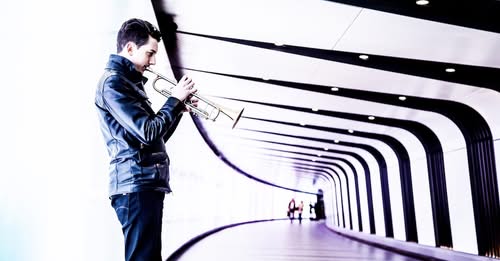
by Ian Mann
November 14, 2025
/ LIVE
"An almost full theatre had clearly enjoyed the concert immensely, reflected in the enthusiastic applause as Freddie and the band left the stage", writes guest contributor Clive Downs.
The Freddie Gavita Quartet in: “Homage to Freddie Hubbard” - November 2025
Progress Theatre, Reading Friday 7 November 2025
Freddie Gavita: Trumpet, Flugelhorn
Tom Cawley: Keys
Daniel Casimir: Bass
Mez Clough: Drums
“By far and away the most awesome technician ever to play jazz trumpet” - jazz trumpeter and writer John McNeil’s assessment of Freddie Hubbard. His namesake explored Hubbard’s music and his progress as a composer and performer.
The quartet opened with an early Hubbard composition, ‘Birdlike’ - a fast, typical bop blues. Freddie’s fluent trumpet improvisation followed the theme, and then solos from keyboards, and bass, before the players exchanged choruses.
Freddie suggested the next piece, ‘Osie Mae’, was a kind of audition for Hubbard at this early stage of his career. A relaxed groove, it put you in mind of the funky minor, medium tempo numbers of Art Blakey’s 1960’s bands. Tom Cawley’s solo at times recalled Bobby Timmons’ driving improvisations with that band.
Moving from his home town Indianapolis to New York, Hubbard had connected with leading jazz artists, and was recommended to be signed by Blue Note records. From this period came the first ballad of the evening, Hoagy Carmichael and Johnny Mercer’s beautiful ‘Skylark’. A short piano intro led us into the trumpet theme statement, played over an effective ‘broken swing’ rhythm section. Among fine solos, a very expressive Daniel Casimir solo stood out.
Another ballad, Coots & Gillespie’s ‘You Go to My Head’, followed, but interpreted here at a brisk tempo. The original Bill Evans recording featured a “weird” introduction, which was echoed here in a free collective improvisation. Mez Clough’s focussed and colourful drum solo came after contributions from keyboards and trumpet.
Herbie Hancock’s wrote just the first four bars of his ‘One Finger Snap’, leaving the rest as chord symbols. Hubbard’s original solo on these chords then came to be the standard melody. Freddie invented an intricate solo, on repeated motifs, developing logically through the chord structure. Tom followed Freddie with bell-like chords to start his own solo. A crisp drum solo, exploring the kit, handed the lead back to trumpet. Behind a constant rhythm, a held note neatly took us in to the catchy opening figures of Hancock’s ‘Canteloupe Island’. After a trumpet solo from Freddie, the first set closed with the brief staccato motif from the tune.
Hubbard appeared again on Wayne Shorter’s ‘Witch Hunt’ - a deceptively simple tune, based on ashort three-note figure. In the ensemble, the band skilfully varied the dynamics, and brought out the ‘punches’ expertly. Freddie’s solo toyed with trills, shakes, and percussive lines. The keyboard solo started in a relaxed mood, and moved into more rhythmically complex areas. It’s beautiful to hear, as in Tom’s, a solo conclude with a restatement of a few bars of the melody.
‘Up Jumped Spring’ is probably one of the most famous jazz waltzes - and surely one of the prettiest. Freddie switched to flugelhorn for this one. All the players created lyrical interpretations in their solos, but Daniel Casimir gave an outstanding improvisation, which seemed to have the rise and fall of speech.
Hubbard left Blue Note records, and signed in 1970 to the CTI label. ‘First Light’ marked a change of style to a more rock-jazz feel, so popular in that decade. Another example of collective introduction (described by Freddie as “a seventies mess around”) led us in to this piece. Distortion, echo, and electronic effects on keyboard set up an authentic atmosphere. A funky piano vamp was followed by the minor theme, based, typically for this period, on a few notes. Freddie, returning to trumpet, soloed first, followed by keyboards and bass. The number concluded with a neat transition into an excerpt from the melody of Hubbard’s ‘Little Sunflower’.
Several jazz musicians have composed tributes to the great innovator John Coltrane. (The previous Jazz in Reading concert included Elvin Jones’s). Hubbard’s ‘Dear John’ is based on the notoriously difficult chord sequence of Coltrane’s ‘Giant Steps’. Freddie’s flugel solo had a warm lyrical feeling, and the bass improvisation moved round the complicated structure so smoothly.
Returning, for the final number, to the CTI era, Freddie chose ‘Red Clay’. Starting with another “seventies mess around”, it launched with a drum intro, joined by keyboards, bass and then trumpet. Another funky number, electronics effects from piano, ‘free’ ensemble – perhaps reminiscent of Miles Davis ‘Bitches Brew’ recorded the year before? On this final piece, we again enjoyed the virtuoso solo and ensemble playing of all the band.
An almost full theatre had clearly enjoyed the concert immensely, reflected in the enthusiastic applause as Freddie and the band left the stage.
Many thanks to the hard work of the Jazz in Reading team, Bob, Jim, Paul, Steve, and Trevor, for keeping live jazz at the Progress thriving in Reading!
Grateful appreciation to our kind hosts, the volunteers at the Progress Theatre, who provide the sound, lighting, and hospitality to support these fine concerts.
CLIVE DOWNS